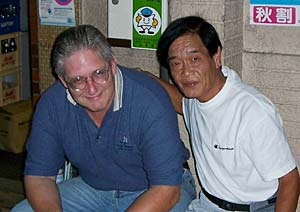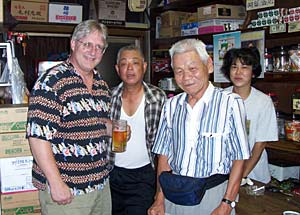 |
Return to index... |
IN A WORDMihara, JapanThere is a family anecdote infrequently told, of an uncle of one of my sisters-in-law who had fought in the Pacific forty years before. When, upon opening his front door at a family get-together, he was confronted with his grand-daughter and her new Japanese boyfriend, he pointed to her and said, "You, c'mon in... " then pointed to the young man and said, "...and you, get the fuck out of here." I once worked as a parts inspector for Butler Automatic in Canton, Massachusetts. My boss was Tony D'Amelio, who told me that as a kid he had participated in the occupation of Japan. He had not fought in the Pacific, but was in Guam awaiting the orders for the expected invasion of Japan. I asked him what he thought of the use of the atomic bombs on Hiroshima and Nagasaki, and his eyes lit up: "They saved my life!"
Mr. White stares as if shocked by my next question. This is not surprising, occurring in a society that a columnist in this morning's newspaper describes as 'a harmony-craving nation, where words are painstakingly weighed and conflict cautiously avoided' "You... very... serious mahn." He squints and grinds and won't look at me, but mumbles not in English for several minutes, seemingly agitated to the extent he no longer tries to churn out the correct English, but is more concerned with his thoughts and emotions, the only words I catch 'atomic' and 'Secon Worl Wah.' He turns to me at the end, and says something to the effect, 'America tries... control the... worl... "
When I first worked with Mitsubishi in Mumbai, India, an angry young man worked with me. Barefoot, scowling, never speaking unless spoken to, he was a proud and independent soul. Working with foreigners from both Hiroshima and the United States must have worked on his mind until one morning, staring at me, he finally stomped up and in hesitant, imperfect English declared, "The bombing of Hiroshima was an atrocity, it was very wrong." I looked at the young Indian, and tried to frame the dropping of the atom bomb in a way he would most appreciate. "Look at it this way," I said to him, "what if Pakistan invaded India, committed a surprise attack and started a war, and in order to defend India, and to win the war, you knew you had to invade Pakistan. And you knew it would cost another million - a million - soldiers to do so... Would you drop an atom bomb on Islamabad in order to prevent the loss of another million innocent Indian souls?" The young man, jaw clenched, stared at me for a moment. Then he said, "I see now that you are correct," and stomped away. My first night in the seaport of Mihara, where is located the sprawling Mitsubishi plant, is spent with three other Americans, Tim Gosack and Mike Brokaw of Mitsubishi/US, and fellow Megtec drier expert Dave Rasmussen. We eat okonomiyaki, a pan-seared noodle dish with choice of octopus, shrimp, or scallops. It is wildly delicious. We engage in the usual humorous banter: we have named the day you leave Japan 'Groundhog Day,' because time-wise you land in the U.S. before you left. We agree it would not advance relations to refer to cooking in a microwave as 'nuking' your food. I tell the others I've been trying to convince the Japanese at work that 'Cleveland, Ohio' means in English to have a really good morning, but that they're not buying it. Staring at seafood menus, it is commented, "I hear they have really righteous weed here... " "A lot of older Japanese will come up to you and the first thing they say is, 'I am not a man of war,'" Tim, who has worked here previously, says. "It's still on their minds." We toast the oddities and differences of an alien culture. It is the 60-year anniversary of V-J day, the victory over Japan. I waited until the woman at the next table, who spoke fluent English and had helped us order our meals, left. Then I raise my glass once more: "Hey, you guys know what day this is... to the Greatest Generation." And four American-held glasses of Kirin beer rush up and clink together here in Japan, forty miles from Hiroshima, in remembrance of things past. Mihara is thirty minutes from where the sun once burst in the sky. The following evening I enter a restaurant alone, and experience the usual: pointing to the menu at what I want, sitting, a fish out of water, among a black-haired crowd which obviously senses my presence. I order a beer with the usual mannerisms; a man stares from the counter. He is Matsui of the Yankees, the same features, same hair, and same eyes. He tries to make eye contact. I nod to him; soon after, there arrives a hot dog on a stick, as well as shrimp on a stick. The waitress motions to Matsui who nods, over and over. He tries to speak, but of course I cannot understand. I nod my thanks, call over "Aligato," and begin to eat. I motion for the waitress to buy him a beer. When it arrives, he is excited, and bows/nods, over and over. He jumps up, and approaches. I have uttered my one word of Japanese; he has only one word of English. He comes to me, shakes my hand then raises his beer and I raise mine. "Peace," is all he says to me, bowing/nodding. And then he says it again, as though to insure I understood. "Peace." |

